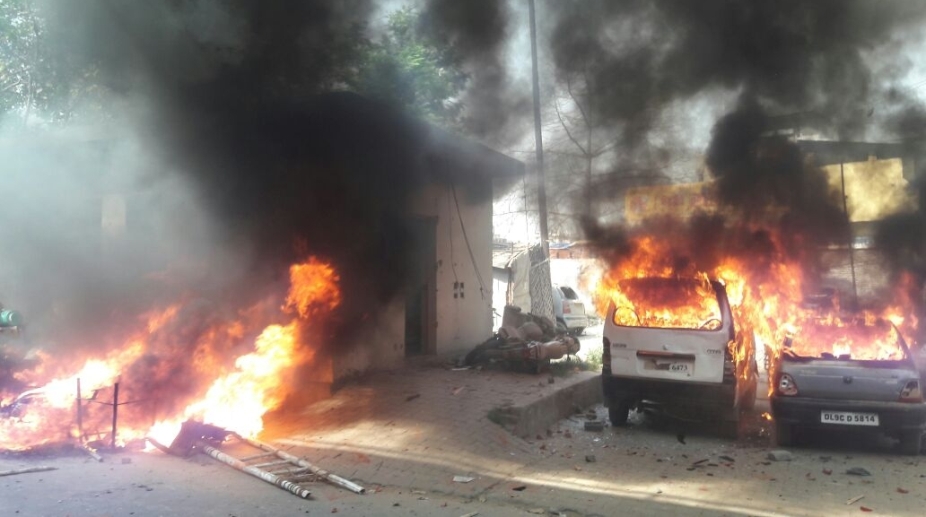‘Congress is quite strong in MP’
With Madhya Pradesh witnessing a no-holds - barred campaign for the Lok Sabha polls, Mukesh Nayak, the newly-appointed head of the Congress media cell in the state, is busy invigorating the party.
Protesters have reportedly gone on a rampage in some states destroying public property, pelting stones, burning tyres and setting vehicles on fire.

Vehicles set ablaze by protesters during a nation wide strike called to protest against the dilution of the SC/ST Prevention of Atrocities Act in Meerut, on April 2, 2018. (Photo: IANS)
Four people are believed to have lost their lives in the ongoing agitations led by Dalit groups in Madhya Pradesh. Two people died in Gwalior-Chambal region while one each in Morena and Bhind districts of the BJP-ruled state.
Some reports claim that they died of gunshot injuries but authorities are yet to confirm how they died. The police claim that it has not fired on any protester.
The violent protests, which broke on Monday across the country, have uprooted normal life. Reports say that effigies of Prime Minister Narendra Modi were burnt in parts of the state.
Advertisement
Schools have been closed in Gwalior. Internet services have been suspended in Bhind, Gwalior and Morena.
Curfew has also been imposed in parts of Gwalior, while Section 144 (prohibits assembly of more than 4 people in the area) was imposed in Sagar.
The Indian Army has been called in to control the situation in Bhind district, where six people have reportedly been injured in firing by protesters.
Madhya Pradesh Chief Minister Shivraj Singh Chauhan appealed for calm stating that the Centre has filed a review petition in the Supreme Court to look into the judgment which has angered the protesters.
“The Government of India has filed the review petition in the Supreme Court today. I appeal to the people to please maintain peace. Our government is committed to protecting the rights of Scheduled Castes and Scheduled Tribes,” he tweeted.
भारत सरकार द्वारा आज सुप्रीम कोर्ट में रिव्यू पिटीशन फ़ाइल कर दी गयी है। जनता से अनुरोध है कि वो कृपया शान्ति बनाए रखें। हमारी सरकार अनुसूचित जाती और अनुसूचित जनजाति के अधिकारों की रक्षा के लिए प्रतिबद्ध है।
— ShivrajSingh Chouhan (@ChouhanShivraj) April 2, 2018
Besides Madhya Pradesh, violent protests were reported from Uttar Pradesh, Bihar and Rajasthan. Protesters have reportedly gone on a rampage in some states destroying public property, stone-pelting, burning tyres and setting vehicles on fire.
Dalit organisations, including the Dalit Shoshan Mukti Manch, and some political parties fear that the alleged dilution of the provisions in the SC/ST Prevention of Atrocities Act by the Supreme Court might lead to increase in violence against Dalits.
Calling for a ‘Bharat Bandh’, angry protesters blocked railway tracks at many places in Bihar. With posters, banners and flags, supporters of the Bhim Army and other Dalit organisations stopped over a dozen long-distance trains, leaving passengers stranded at Patna, Gaya, Jehanabad, Bhagalpur, Ara, Darbhanga, Araria, Nalanda and Hajipur railway stations.
Punjab, which has the largest share of Dalits in its total population across the country, has been put on high alert with hundred of security personnel deployed ahead of a protest. Internet services in the state have been suspended since 5 pm on Sunday and will continue till 11 pm today.
Traffic was brought to a standstill in Delhi as protesters marched with flags and banners on the roads. Congestion in the main stretches led to further congestion on arterial roads. Many were stuck in traffic in the peak hours.
Why the protests?
Dalit groups called for ‘Bharat Bandh’ against a Supreme Court order to amend the SC/ST Prevention of Atrocities Act.
In a judgment issued on 20 March, the Supreme Court said that the arrest of an accused under the Act is not mandatory and recourse to coercive action would be only after preliminary inquiry and sanction by the competent authority.
Coupled with this, the court said, that there was no “absolute bar against grant of anticipatory bail in cases under the Atrocities Act if no prima facie case is made out or where on judicial scrutiny the complaint is found to be prima facie mala fide”.
“…, we direct that in absence of any other independent offence calling for arrest, in respect of offences under the Atrocities Act, no arrest may be effected” without the permission of appointing authority in case of public servant or that of Senior Superintendent of Police in case of general public, said the bench of Justice Adarsh Kumar Goel and Justice Uday Umesh Lalit in its judgment.
The bench said it provided for the safeguard “in view of acknowledged abuse of law of arrest” under the Act.
The court’s decision was aimed at protecting honest officers from misuse of the provisions of the Act. The protesters are demanding that the provisions related to immediate arrest be restored claiming that the dilution creates a sense of insecurity and makes getting justice even more difficult.
(With inputs from agencies.)
Advertisement